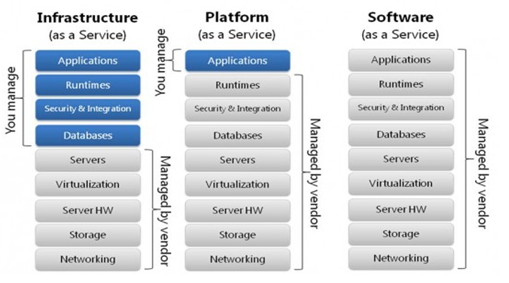Cloud Paas Features & Benefits
There are, broadly speaking, three major categories of Cloud Computing:
• Infrastructure as a Service (IaaS), which provides only a base infrastructure, leaving the end user responsible for platform and environment configuration necessary to deploy applications. Amazon Web Services and Microsoft Azure are prime examples of IaaS.
• Software as a Service (SaaS) like Gmail or Salesforce.com.
• Platform as a Service (PaaS), which helps to reduce the development overhead (environment configuration) by providing a ready-to-use platform. PaaS services can be hosted on top of infrastructure provided by an IaaS.

The Cloud Foundry platform is an open source, multi-cloud application platform-as-a-service (PaaS). It’s governed by the Cloud Foundry Foundation.
It’s important to be able to visualize exactly which elements of the compute ecosystem are whose responsibilities. While there is no precise definition, it’s reasonable to say that a platform requires only that you take care of your applications.
With that in mind, the platform layer should be able to provide:
• A suitable environment to run an application.
• Application life cycle management.
• Self-healing capacity.
• Centralized management of applications.
• Distributed environment.
• Easy integration.
• Easy maintenance (upgrades etc).
What is Cloud Foundry
Cloud Foundry is an open source cloud computing platform originally developed in-house at VMware. It is now owned by Pivotal Software, which is a joint venture made up of VMware, EMC, and General Electric.
Cloud Foundry is optimized to deliver
• Fast application development and deployment.
• Highly scalable and available architecture.
• DevOps-friendly workflows.
• Reduced chance of human error.
• Multi-tenant compute efficiencies.
Not only can Cloud Foundry lighten developer workloads but, since Cloud Foundry handles so much of an application’s resource management, it can also greatly reduce the overhead burden on your operations team.
Cloud Foundry’s architectural structure includes components and a high-enough level of interoperability to permit…
• Integration with development tools.
• Application deployment.
• Application lifecycle management.
• Integration with various cloud providers.
• Application Execution.
Although Cloud Foundry supports many languages and frameworks, including Java, JavaScript, Go, PHP, Python, and Ruby, not all applications will make a good fit. As with all modern software applications, your project should attempt to follow the Twelve-Factor App standards
Key benefits of Cloud Foundry:
• Application portability.
• Application auto-scaling.
• Centralized platform administration.
• Centralized logging.
• Dynamic routing.
• Application health management.
• Integration with external logging components like Elasticsearch and Logstash.
• Role based access for deployed applications.
• Provision for vertical and horizontal scaling.
• Infrastructure security.
• Support for various IaaS providers.
Popular Alternatives for Cloud Foundry
• Google App Engine
• Heroku Enterprise
What is Google App Engine?
Google has a reputation for highly reliable, high performance infrastructure. With App Engine you can take advantage of the 10 years of knowledge Google has in running massively scalable, performance driven systems. App Engine applications are easy to build, easy to maintain, and easy to scale as your traffic and data storage needs grow.
Key Benefits of Google App Engine?
• App Identity
• Blobstore
• Capabilities
• Channels
• Datastore
• Datastore Backup/Restore
• Dedicated Memcache
• Go Runtime
• Google Cloud Endpoints
• Google Cloud SQL
• Google Cloud Storage Client Library
• Images
• Java Runtime
• Logs
• Mail
• MapReduce
• Memcache
• Multitenancy
• OAuth
• PHP Runtime
• Python Runtime
• Remote Access
• Scheduled Tasks
• SendGrid
• Task Queue
• Task Queue Tagging
• Traffic Splitting
• URL Fetch
What is Heroku?
Heroku is a cloud application platform – a new way of building and deploying web apps. Heroku lets app developers spend 100% of their time on their application code, not managing servers, deployment, ongoing operations, or scaling.
Key Benefits of Heroku Enterprise
• Fine-Grained Access Controls
• Heroku Private Spaces
• Shared Application Portfolio
• Heroku Enterprise Account Team
• Add-on Controls
• SSO for Heroku
• Team and User Administration
• Resource Utilization Management
• Enterprise Grade Support SLA
Congratulations @sridhar.natuva! You received a personal award!
You can view your badges on your Steem Board and compare to others on the Steem Ranking
Vote for @Steemitboard as a witness to get one more award and increased upvotes!